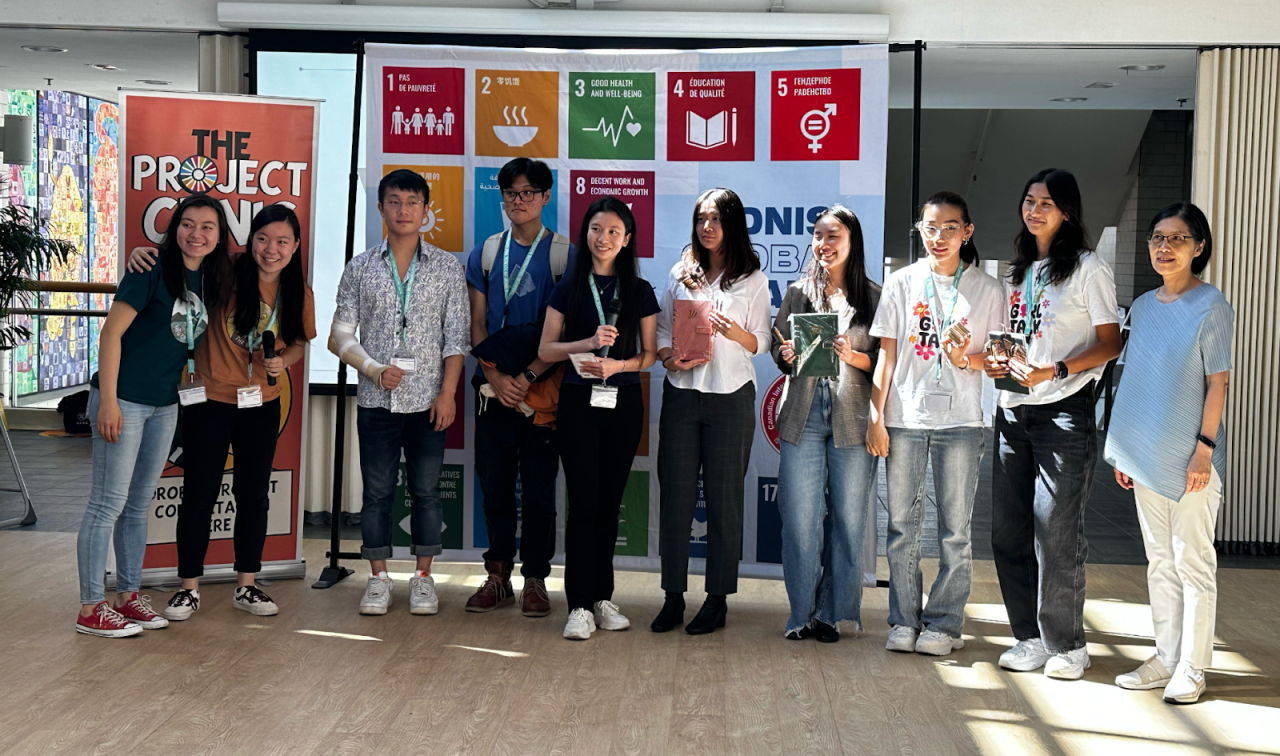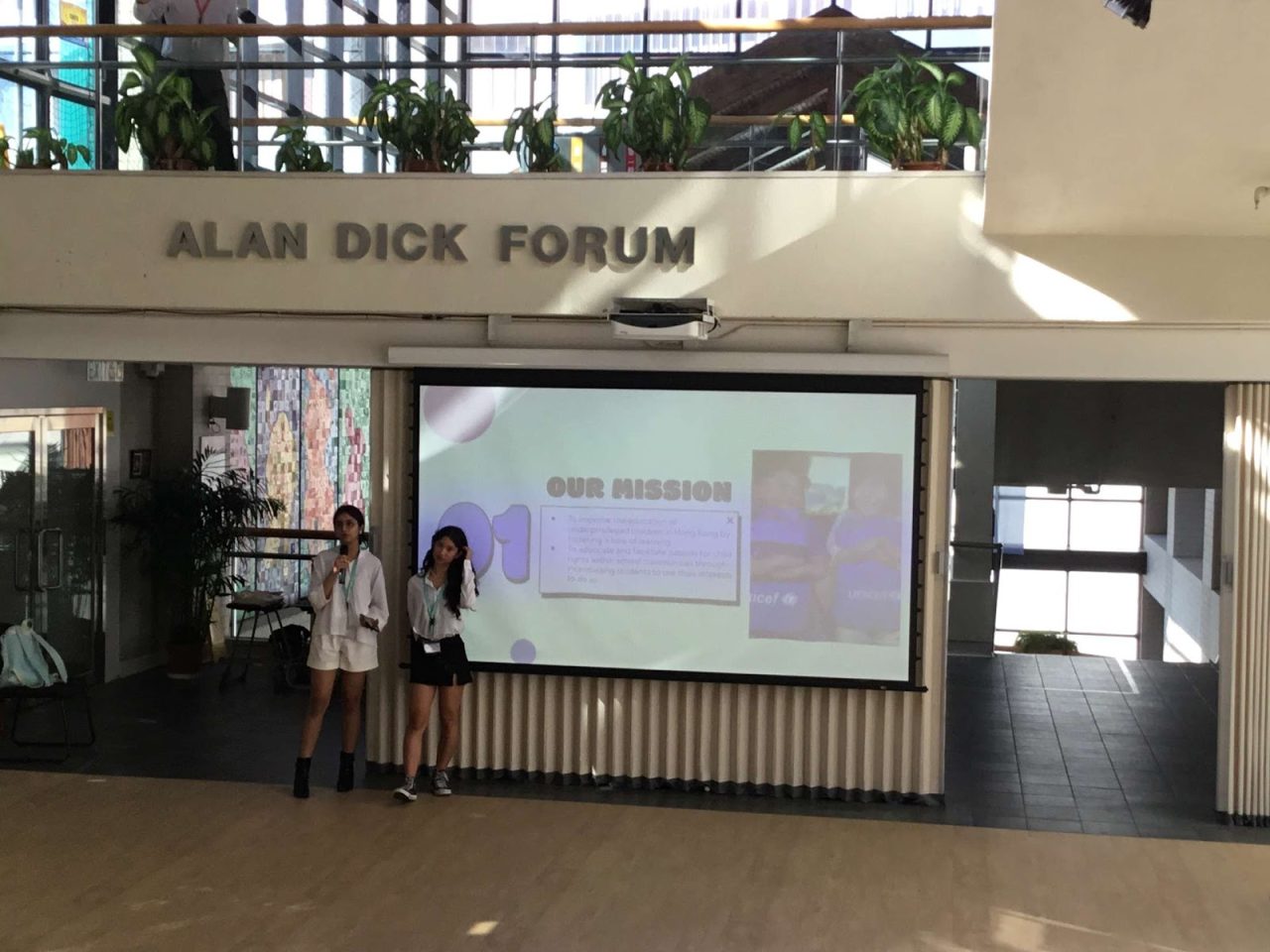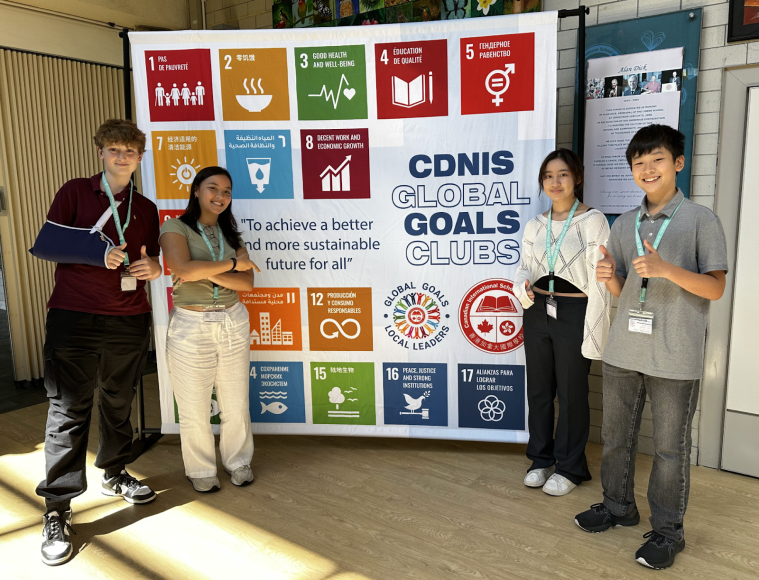Recently, some of our dedicated student groups came together to attend the 2nd annual CDNIS Global Goal Council Club-A-Like event. Held at the Canadian International School of Hong Kong, this meeting of minds provided a platform for clubs from various schools in Hong Kong to connect, share, and enhance their contributions to Sustainable Development Goals (SDGs).
Our students participated in a workshop hosted by esteemed HKU faculty and students, presenting their initiatives and gaining new perspectives on design thinking. We commend their active involvement and the collaborative spirit they displayed, and we are excited about the potential growth and development of their projects.
The following is a breakdown of the successes shared by our student groups:
Green Cobras:
The DC Green Cobras focus on Sustainable Development Goals 4 and 11 to 15. We specifically work towards these SDGs in as many ways imaginable by taking action in our local community. Examples of previous actions include the Reusable Mask Competition, which was initiated with KGV’s marine-focused environmental group, the 2023 Earth Day WWF Fundraiser, and ongoing CCAs for Primary students.
Last weekend was an unforgettable experience. We had a great opportunity to meet clubs from different schools with similar interests and the same goals in mind. Because of this, we now have a greater chance of collaborating and making an impact on a wider level.
We found the challenge incredibly intense and demanding as we only had 40 minutes to create a concrete solution to the problem of plastic pollution. The fact that we also had to adhere to criteria and create a pitch to judges from HKU within this period amplified our nervousness.
Our idea was to create a contraption that utilised the functions of a shovel and sieve. When used on a beach, it would efficiently filter a scoop of sand by separating microplastics from the sand. This idea emerged from the local issue found at Nim Shue Wan beach and how it affects the quality of life for fishermen living there. We found this idea highly relevant to the criteria and were only two points short of winning. It was an overall successful day and opened us up to many more opportunities and relationships.
Our idea was to create a contraption that utilised the functions of a shovel and sieve – when used on a beach, it would efficiently filter a scoop of sand by separating microplastics from the sand. This idea emerged from the local issue found from the Nim Shue Wan beach and how it affects the life quality of fishermen living there. We found this idea highly relevant to the criteria and were only two points short of winning. It was overall a successful day and opened us up to many more opportunities and relationships.

Yega:
As the leader of STEMcademy, I focus on Global Goals 4: Quality education and goal 10: reduce inequalities. 70% of students in poverty have never taken STEM related courses because of financial difficulties and lack of resources, and this is what we emphasise to change at STEMcademy. My project is primarily focused on providing learning opportunities for underprivileged primary or secondary school students in the Hong Kong community who lack access to educational resources. We promote the importance of science, mathematics, design and technology, and other STEM-related subjects in education. To a successful kickstarter, we are the winners of the Kids4Kids Youth Summit competition, where Kids4Kids funded us 3000 HKD to pursue our projects, resulting in excellent workshops for primary students to teach robotics, astronomy and architecture. Throughout the experience, I’ve collaborated with GirlsTalk at Canadian International School, working on solving a case study of inequity for women in STEM in the short time period of 40 minutes. I have been fortunate enough to have a winning proposal, allowing me to learn that STEM can always fight for quality education anywhere, anyhow. I would like to thank my fellow teammates from ESF King George V school, also great role models of young women in STEM. I look forward to collaborating with The University of Hong Kong to pursue my project.

Rysa & Katie:
As the chairperson and secretary of UNICEF Club, attending the Club-A-Like at CDNIS was both a well-connecting and engaging opportunity for us to expand our club’s mission. With our main mission being advocating for the child rights and SDGs as a whole, we focus on the target goal of 16.2.2 which concerns violence against children while also targeting goal 4, in regards to quality education.
So far, in order to pursue our main goal of helping students and underprivileged children achieve their full potential, we’ve collaborated with the Kids4Kids Club at Discovery College to help raise resources for volunteer sessions. This included collecting volunteer donations, corresponding with the library to choose books accommodating the theme ‘Shall We Talk?,’ discussing the stigma around accepting your emotions and mental health, and finally with all these efforts amalgamating to gather a group of 17 passionate volunteers helping instil the love of reading and learning in special needs children at the Lok Yung District Support Centre. Additionally, we’ve started planning an internal student-to-student tutoring service for Discovery College students to use along with two other secondary students and a book club for our year that can hopefully expand to other year groups.
Our next steps include organising a few events, such as an art gallery or a summit in subsequent months at DC to help promote this idea while also taking into account student strengths and interests and how they can apply said strengths and interests to promote the SDGs and UNICEF’s mission. As for the 40 minute challenge, our idea was to create tailored tutoring services for special needs children on a student-to-child basis that helped understand their requirements on a deeper level, namely the attention to habits such as the need to fidget, or the lack of trust often had between volunteer and child which our plan accounted to help and foster connections. This was to help them destigmatise themselves from the idea that they couldn’t learn, when in fact they would be just as capable should they have the right accommodation. Though we were close to winning, we believe this idea can still make a difference should it be pursued in the near future, with collaboration with the UNICEF Club at CDNIS being fruitful and helping us facilitate meaningful discussions to solve this matter. We look forward to more collaboration in the future, and would like to thank the Kids4Kids volunteers at DC as well as Csombor for the extensive help on the website design and development on the tutoring site. Look out for more opportunities presented by us in the next few months!

